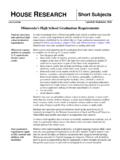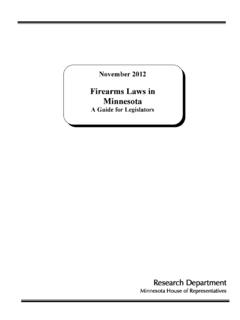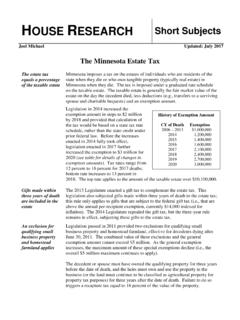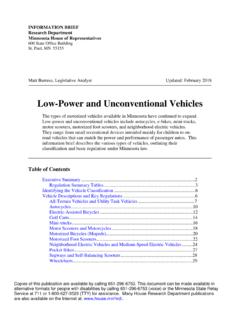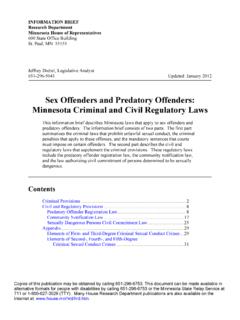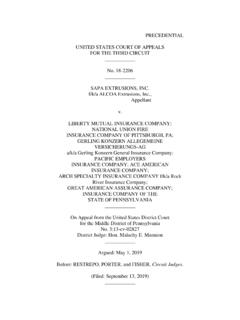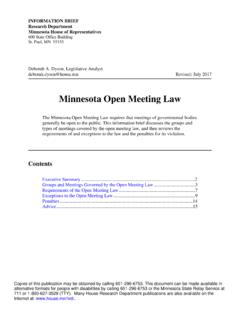Transcription of Minnesota's Forfeiture Laws - house.leg.state.mn.us
1 INFORMATION BRIEF. Research Department minnesota House of Representatives 600 State Office Building St. Paul, MN 55155. Ben Johnson, Legislative Analyst Updated: October 2017. Minnesota's Forfeiture Laws Police departments and similar agencies have the right to seize property associated with certain crimes and, under proceedings known as civil Forfeiture , . assume ownership of the property. There are two forms of civil Forfeiture : judicial and administrative. Judicial Forfeiture requires a court order before an agency can take ownership of a person's property. Administrative Forfeiture allows an agency to take possession before any court review, but requires it to give notice to the owner. This information brief describes the laws dealing with Forfeiture and discusses cases of note in minnesota and recent changes made to Forfeiture laws.
2 Contents 1. General Forfeiture Law ..3. 2. Specific Forfeiture Laws ..11. 3. Major Constitutional Issues ..15. 4. minnesota Cases of Interest ..18. 5. minnesota Legislative Action ..19. 6. The Federal Government's Equitable Sharing Program ..21. Appendix ..22. Copies of this publication may be obtained by calling 651-296-6753. This document can be made available in alternative formats for people with disabilities by calling 651-296-6753 or the minnesota State Relay Service at 711 or 1-800-627-3529 (TTY). Many House Research Department publications are also available on the Internet at: House Research Department Updated: October 2017. Minnesota's Forfeiture Laws Page 3. In particular, this information brief includes the following: Part 1 summarizes the general Forfeiture law applicable to most felony offenses, including judicial, administrative, and summary Forfeiture .
3 Part 2 describes several special Forfeiture laws that apply to particular criminal offenses such as DWI violations, game and fish violations, gambling crimes, and racketeering crimes. Part 3 briefly discusses the circumstances under which a court may rule that a particular Forfeiture violates the Constitution's prohibition against excessive fines or double jeopardy.. Part 4 highlights several minnesota cases of interest. Part 5 examines the legislative changes made in 2010 following the shutdown of the Metro Gang Strike Force. Part 6 provides a brief overview of the federal program known as equitable sharing. An appendix provides definitions of terms and statutory references. 1. General Forfeiture Law Minn. Stat. to Seizure of Property in Advance of Forfeiture minnesota law permits a law enforcement agency to seize forfeitable property in advance of its Forfeiture .
4 Seizure may be made pursuant to a formal authorization issued by any court having jurisdiction over the property. The law also authorizes seizure without formal authorization under the following circumstances: the seizure is incident to a lawful arrest or a lawful search the property has been the subject of a prior judgment in favor of the state in a criminal injunctive or Forfeiture proceeding the appropriate agency1 has probable cause to believe that the delay required to obtain court process would result in the property's removal or destruction and that the property is either dangerous to health or safety or was used or is intended to be used to commit a felony When an officer seizes property, the officer must provide a receipt to the person found in possession of the property or leave a receipt where the property was found.
5 The seizing agency 1. See appendix for the definition of appropriate agency. This publication will use the terms seizing agency . and law enforcement agency in lieu of appropriate agency.. House Research Department Updated: October 2017. Minnesota's Forfeiture Laws Page 4. must use reasonable diligence to secure the property and prevent waste. Minn. Stat. , subds. 4, 5. The owner of the seized property may give security or post a bond in an amount equal to the property's retail value and, thereby, regain possession of the property. If this is done, the Forfeiture action proceeds against the security as if it were the seized property. This option is not available if the property is contraband or is being held for investigatory purposes. Alternatively, if the seized property is a motor vehicle, the owner may regain possession of the vehicle pending determination of the Forfeiture action by surrendering the vehicle's certificate of title to the seizing agency.
6 The agency must notify the Department of Public Safety and any secured party noted on the certificate that this has occurred and must notify them if and when the certificate of title is returned to the owner. Minn. Stat. , subd. 5a. Seizures of motor vehicles used to commit certain prostitution crimes or used to flee from a pursuing peace officer are governed by more restrictive provisions. 2 These provisions apply to the seizure of vehicles from persons alleged: (1) to have engaged in or hired another to engage in prostitution; or (2) to have fled from a peace officer in a manner that endangered life or property. If such a vehicle is seized before a judicial Forfeiture order has been issued, a hearing must be held before a judge or referee within 96 hours. Notice of the hearing must be given to the registered owner within 48 hours of the seizure.
7 3 The prosecutor must certify to the court before the hearing that he or she has filed or intends to file charges against the alleged violator. After the hearing, the court must order the motor vehicle returned to the owner if the prosecutor fails to certify that charges have been filed or will be filed in the case, the owner has demonstrated that he or she has a defense to the Forfeiture , or the court has determined that seizure of the vehicle would create an undue hardship for members of the owner's family. If a seized vehicle ultimately is not forfeited, neither the owner nor the alleged violator is responsible for seizure and storage costs. Minn. Stat. , subds. 3, 4. Judicial Forfeiture minnesota law allows the state to take possession of a person's property under certain circumstances.
8 The process of judicial Forfeiture allows law enforcement to seize property, but prevents the government from selling, destroying, or otherwise disposing of the property until a court order grants that power. 2. In 2003, the minnesota Court of Appeals ruled that a vehicle Forfeiture for fleeing a peace officer is governed exclusively by minnesota Statutes, section , subdivision 4, and as a result, a defendant may not seek possession of the vehicle by surrendering its title before the Forfeiture action is determined. Gaertner v. One 1999 Dodge Pickup Truck, 668 25 (Minn. Ct. App. 2003). 3. These time limits do not apply to the seizures of recreational vehicles or motorboats allegedly used to flee a peace officer. House Research Department Updated: October 2017. Minnesota's Forfeiture Laws Page 5.
9 Judicial Forfeiture ; Designated Offenses minnesota law permits a court to order the Forfeiture of certain property associated with the commission of a designated offense.. The definition of designated offense includes most serious felonies against persons, a number of property felonies, and felony or gross misdemeanor violations of the crime of unauthorized computer access. It also includes the gross misdemeanor crime of carrying a rifle or shotgun in a public place and certain prostitution crimes, regardless of the penalty prescribed for the violation. Minn. Stat. , subd. 1. The term does not include controlled substance offenses, however. These offenses are governed by the special Forfeiture provisions described in the next section. (See the appendix for a complete list of the crimes included within the definition of designated offense.)
10 Property is subject to Forfeiture if it was either: (1) personal property used or intended for use to commit or facilitate the commission of a designated offense; or (2) real or personal property representing the proceeds of a designated offense. Additionally, all contraband property is subject to Forfeiture as is any weapon used or possessed in furtherance of any criminal code violation, controlled substance offense, violation of chapter 624, or violation of a domestic abuse order for protection. Minn. Stat. ; , subd. 3. Property associated with a designated offense (other than weapons and contraband) may be forfeited by judicial order, following a civil in rem proceeding. Minn. Stat. The government has the burden of proving by clear and convincing evidence that the property is subject to Forfeiture .
